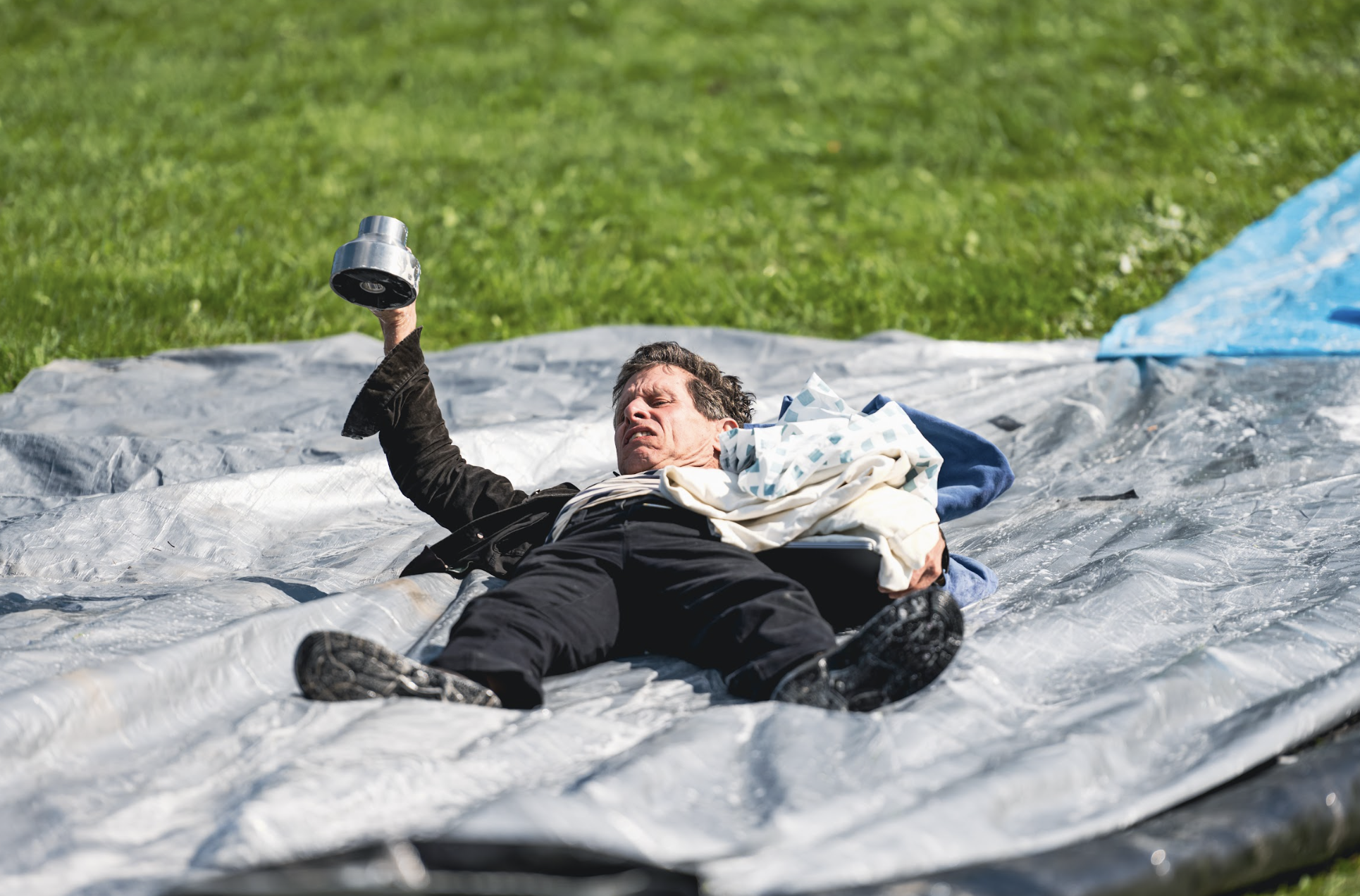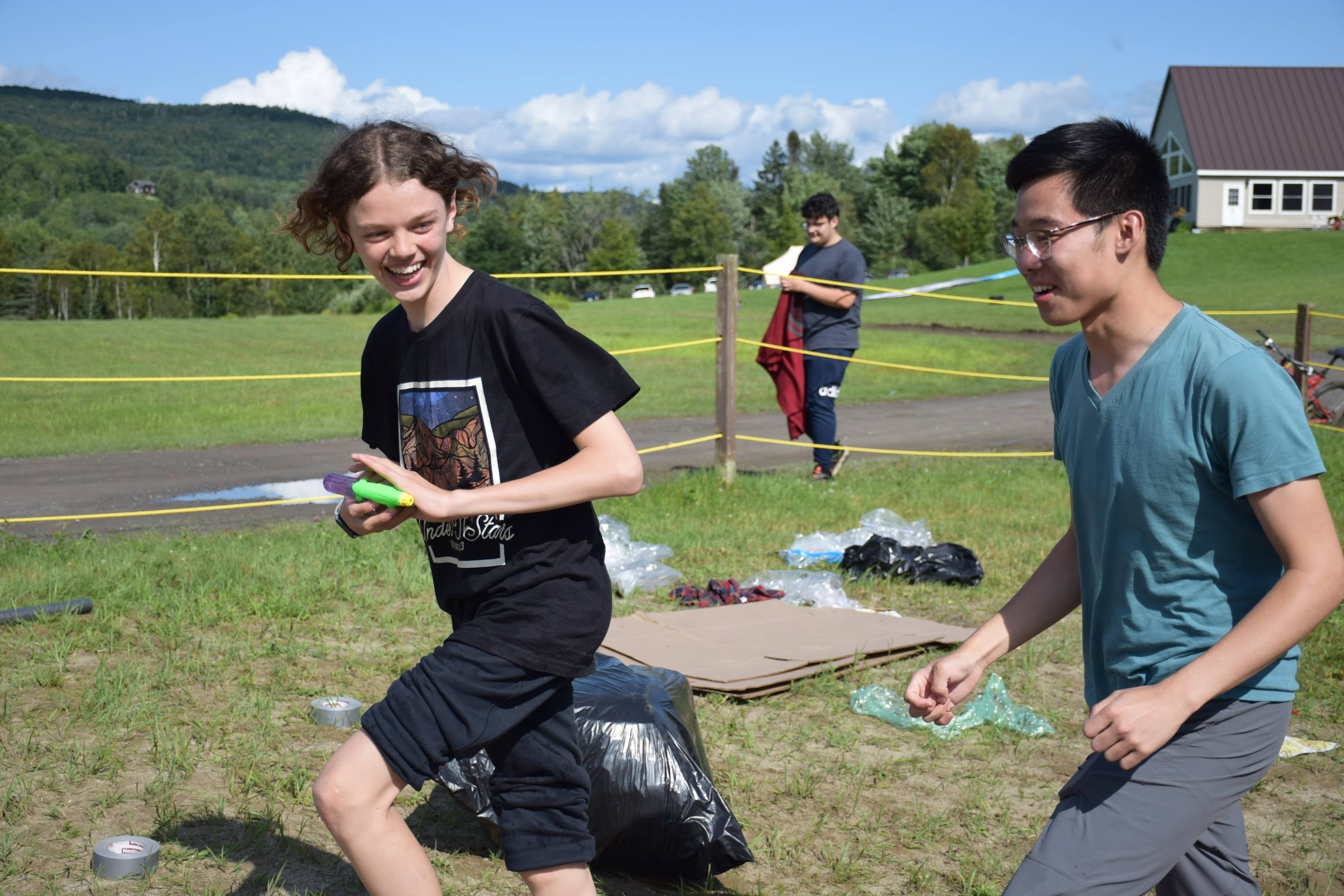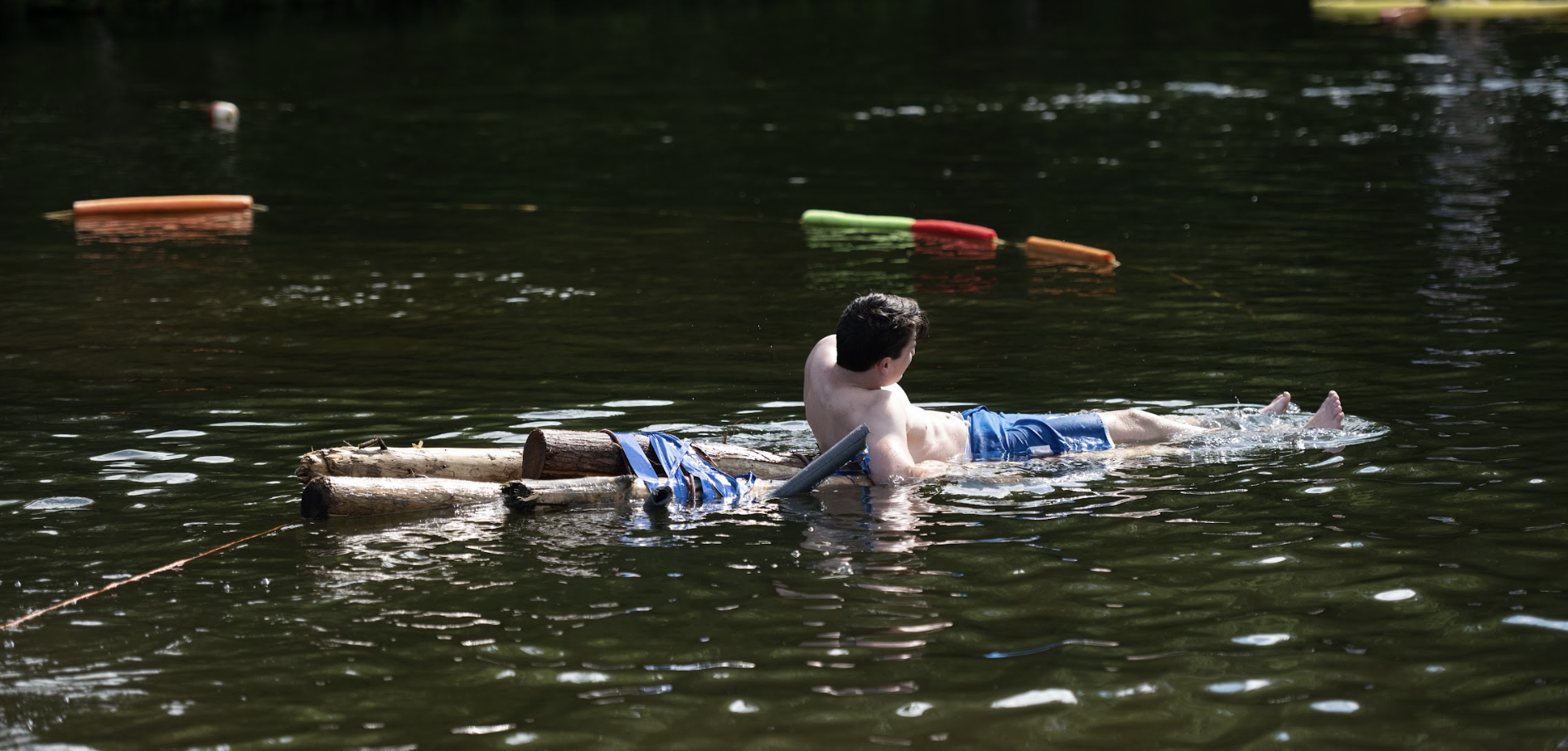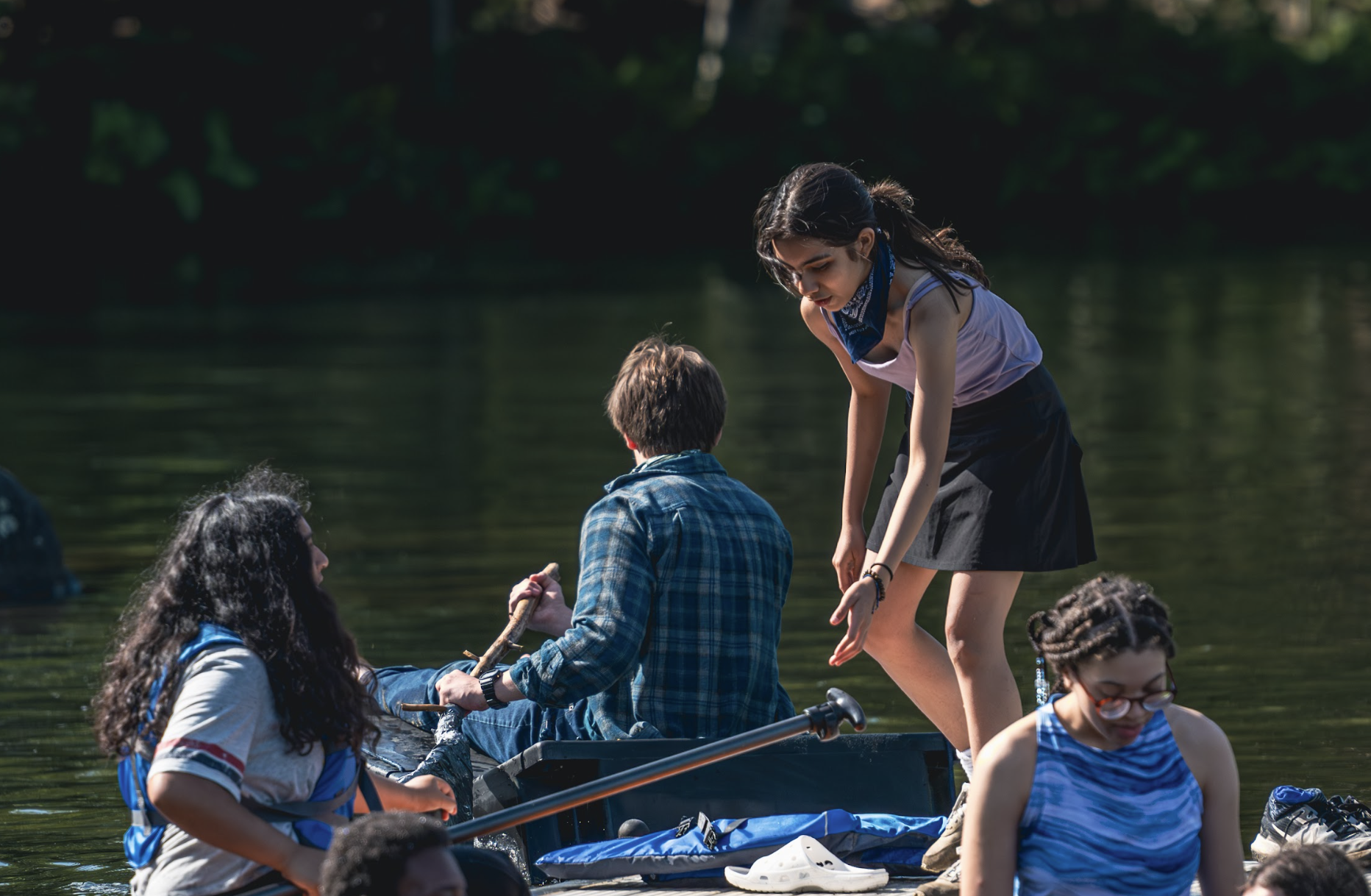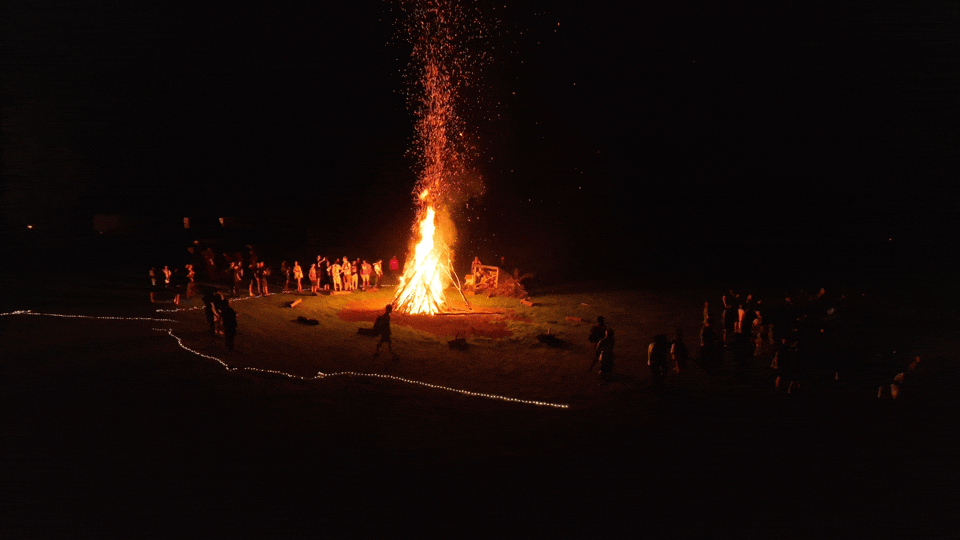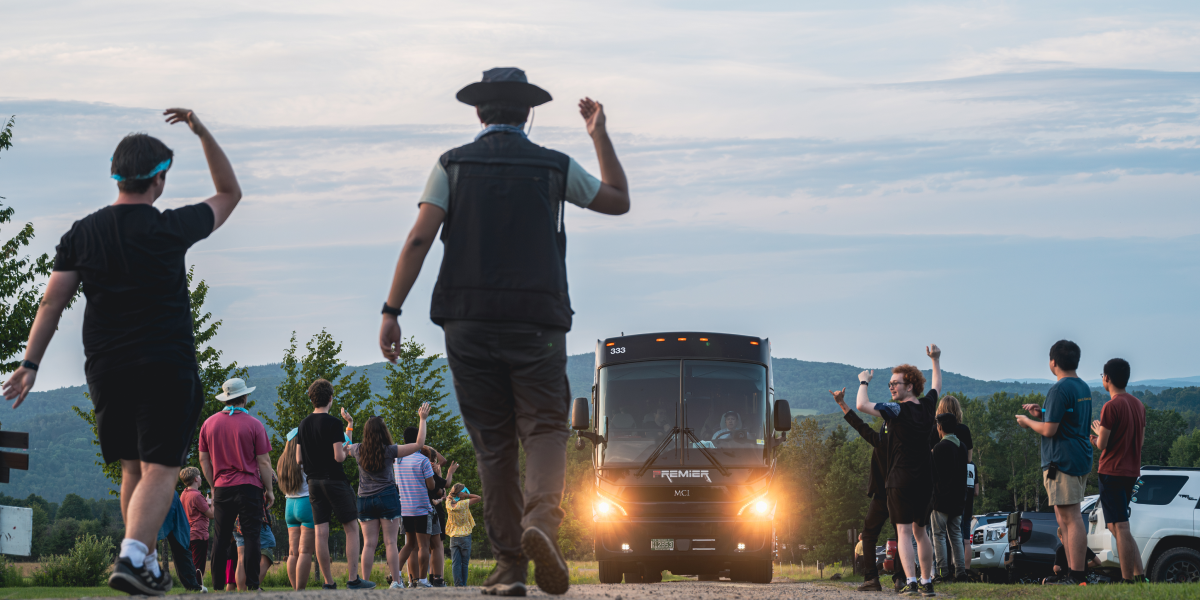Every summer, Hack Clubbers do something special. In 2023 we ventured out to the Northeast Kingdom of Vermont for Outernet — a four-day experimental coding/camping trip. Together, we turned a semi-abandoned campsite into a bustling hacker oasis.
This is the story of how and why we did it.

Our goal is to open-source everything we have about Outernet, from half-baked ideas to our full itemised budget. No two events are the same but we hope that within this repository, you can find inspiration for your own special event.
Magical moments happen when we take people out of their comfort zone. We've run countless hackathons in flash indoor spaces, how about doing one outdoors?
We're surrounded by incredible nature out here in Vermont, it was a great opportunity to do something different. As organisers, we were venturing out of our comfort zones ourselves. That was both exciting and scary for us. We knew that exploring the outdoors would leave attendees with an experience they'd treasure for the rest of their lives; that's what convinced us to go for it.

Once we felt confident about running an event outdoors, we started looking for a format. Our initial plan was to focus the event around the concept of building our own hacker village. We were taking inspiration from European hacker camps (eg. Electromagnetic Field), ToorCamp, and Burning Man. The idea behind building a hacker village would morph into guilds. Over time, however, our focus became less on the village and more on an individual's experience. We started working with this idea of Outernet being a choose-your-own-adventure event. At previous events of ours, it had always felt like the best moments were the ones attendees created for themselves. We'd find the space, and attendees would create their experience.
Then there was the (slightly contentious) question of "To what extent is Outernet a hackathon?". We wanted everyone to be making and shipping projects just as they would at a hackathon. At the same time, we wanted a hacker's experience to be personalised and flexible. Our approach would be to make Outernet the perfect environment for building outdoors and to create an atmosphere in the camp where the cool thing to do at any given time was to be making cool things. Over the weekend, you could ship as many things as you wanted.
The group's goal was to fill our wall of ships:

The weekend would close out with us all coming together to celebrate and demo everything we shipped over the weekend. With a full wall of ships, we'd all have succeeded together.
We wanted to do something outdoors, but where? We needed to find a campground for Outernet. Our starting point was a connection to a festival venue in Upstate NY: Otis Mountain.

We ran with that for a long time, but eventually, the complexity of it caught up with us. We wouldn't have running water, septic tanks, a connection to the grid, or a waste disposal service. We were back on the hunt for a venue.
We tried working with a retreat venue. They wanted $50k.
We almost went with a nudist colony. They refused to give us exclusive access.
It wasn't looking good, then, an old friend of Woody called him back. He was the owner of an old Christian campground, Covenant Hills Camp in the Northeast Kingdom. They hadn't been fully operational since 2015 but they had large shelters, a connection to the power grid, a large underground water tank, regular waste removal, functional toilets, lukewarm showers, and surprisingly fast DSL internet. Whilst it wouldn't be glamping, Covenant Hills provided us a nice balance between having basic necessities and taking hackers out of their comfort zone.
We went and visited the space, and it was exactly what we were looking for.
Nature can serve as great inspiration for technical projects; it can also be uncomfortable and distracting. We wanted people to find a balance between exploring the outdoors and coming together to program.
For Outernet to work as a hackathon, we needed to provide: space, inspiration, and an end goal.
By default, your classic hackathon chair and table setup doesn't exist at a campground. We set up outdoor seating around the campground as well as three indoor makerspaces: The Barn / The Hardware Shack, The Cafe, and The Cookhouse. Each makerspace had tables and chairs laid out for hackers to work from.
The Barn was a multipurpose space. During the day, it was "The Hardware Shack", meanwhile, at night it was the home of our performances and our late-night get-togethers (more on that later!). The Hardware Shack was the great work of Kevin & Cheru, Hack Clubbers in Boston (MA) & Burlington (VT) respectively. The space was stocked full of old electronic toys from Goodwill, assorted electronics parts, all sorts of hand tools and four 3D printers.
The Cafe was a community-ran space; they had barista service 24/7, relaxing music playing on a record player, and art on all of the walls. It became a really nice space for hackers looking for some quiet focus time away from the bustle of The Barn and The Cookhouse as they worked on their projects.

Lastly, we had The Cookhouse. It was also a multipurpose space during the event; alongside being a makerspace, we'd also serve meals (hence the name) and hosted lightning talks there.

The spaces we were using for hacking had internet access, powered by the OuterLAN guild. We had a local network with access points scattered across the campground and at the three makerspaces, we had internet access through Starlink (which cut out exactly every 9 minutes and 26 seconds). Internet proved to be a big challenge for us, you can read the whole story at github.com/hackclub/outerlan.
We wanted our hacking spaces to also serve as spaces for learning and picking up new skills. Throughout the weekend, we hosted a collection of workshops around the camp and had daily lightning talk sessions. At Outernet we deviated slightly from the normal way workshops at hackathons work; instead of picking workshops individually and creating our own list of workshops, we let anyone run a workshops and had the participants determine which workshops would be best for them. To make this work, we had each person who wanted to run a workshop/lighting talk submit a PR with some information about their sessions. After this, we reviewed each submission, proposed recommendations / small changes, and then merged their PR.
Lightning talks were a big hit! We had talks on everything from India's tax system to visualising the entire internet. We encouraged folks to come up with the wackiest topics they could and then PR their idea to this repository. Lightning talks were so popular on the first day that we added an extra slot on the second day's lunch!
Every workshop and lightning talk's outline can be found in /workshops-and-lightning-talks.
We created the expectation amongst attendees that Outernet would be a technical event by having every participant set themselves a personal goal and provide a prompt at the Opening Ceremony.
The prompt we chose was "make people laugh." It was flexible, clear, and positive. Plus, everyone loves to have a good laugh at demos!

Beyond providing a prompt, we also asked every participant to write a goal during the opening ceremony. It prompted everyone to start asking themselves questions about what they wanted to achieve over the weekend that'd hopefully led to an idea for the hackathon. Folks who were comfortable were able to share their personal goals on stage:

Demos are the culmination of a hackathon, hackers should leave demos feeling fulfilled and like they've achieved something out of the weekend. It gives everyone a special opportunity to see what others made over the weekend and celebrate one another's creations.
Shipping began during the first hour of Outernet, and we set up a big banner in the town square for people to write about the ships. The goal was for the banner to be full by the end of the weekend:

This encouraged people to build as many projects as they'd like during the event. It also gave the group a collective goal; we'd all win if the board was filled (in contrast to one project being selected as the definite "winner").
At the end of the event, on Sunday, we had demos! We gathered everyone in the town square. To begin, people wrote their final ships on a big piece of cloth. Then, people set up stations to demo their projects. Everyone had a board like this:

On the board, people would be able to paste stickers (like reactions on Slack but IRL) and write congratulatory words (like at the back of a high-school yearbook). Demos brought everyone together and left people with a sense of achievement.
After everyone had shown off their projects to each other, we gathered in the town square again. This time everyone could get up on the rock and give a quick pitch/demo of their project. Everyone hooted and hollered for each other's projects; it was a special moment that provided closure to the weekend and gave everyone the special feeling of being appreciated by a crowd.
Camping is incredible; the shared experience of it is able to bring people together in really special ways. A couple of weeks before Outernet, a bunch of us went camping for a night in Charlotte, VT. We danced around the campfire to music, toasted marshmallows, and chatted for hours around the campfire. We wanted to make sure everyone at Outernet had an equally magical time. We wanted to make sure everyone at Outernet had an equally magical time.
To start, everyone needed a place to sleep, and that meant acquiring tents and camping supplies for over 150 people. We worked with a local company called KitLender and hired a tent crew to help us with setup. KitLender provided us with a collection of six to twelve-person tents (we had them at approx. 75% capacity). They also provided each a hacker with a sleeping bag, a sleeping mat, a camping pillow, and a headlight.
At check-in, to help hackers with settling in and getting set up, we sorted everyone into groups of approximately 20 people (sleeping pods). They had a leader who would help them find a tent and get all their gear. It was certainly a change-up from previous hackathons; in some ways, sleeping with comfortable gear is an improvement, but sleeping in a small shared space was certainly a new experience for some hackers.

Earlier on, we mentioned the idea of building our own hacker village, and guilds were our final implementation of that idea. Guilds gave hackers a framework to run their own things during Outernet. If there's something a hacker would like to have at Outernet, they started a guild focused on it. Even some of the core aspects that were entertained at Outernet sprouted from a guild and a team with ideas such as OuterLAN and Outernet Cafe! We gave each guild $250 in funding through HCB and helped them secure tents for their guild. On the day, guilds brought the campground alive. Each of them brought their own unique thing to the event ranging from crochet materials to boat-building tools. The full list of guilds is at guilds.md.
By virtue of being in the middle of nowhere, we had to make food for everyone on site ourselves. Fortunately, we had an industrial kitchen on site that we could use to prepare food. We hired a friend of Hack Club's, Lonny, to lead the kitchen crew. Every night his crew would cook up a homemade meal (baked ziti, hamburgers, hot dogs, and pasta) and serve it at The Cookhouse. Meanwhile, for lunches, we did build-your-own sandwiches/salads. For most days, breakfast was a relatively simple continental buffet (yogurt, cereal, bread, etc.). On Sunday morning, we made a special pancake breakfast using maple syrup from the farm next door to us. For nearly all of these meal services, Ruien, a student summer intern at Hack Club, ran front-of-house operations for The Cookhouse, including setup, cleaning, and teardown, and coordinated with the kitchen and staff to make sure food was freshly made and served in a timely manner to his fellow campers.
Lonny and his crew did an incredible job; every meal was a joy to consume, and it was nice to have so many locally-sourced ingredients.
We've mentioned him before, but now feels like a good time to introduce Woody, an incredible actor/performer, and professional clown. We've known him since HQ moved to Vermont and regularly head up to concerts on Mt. Foolery, which Woody runs. Woody was Outernet's Coordinator of Fools.
One of our nightly rituals was to gather everyone for a show at the end of each day. On the first evening, after dinner, we kicked things off with an outdoor show, a marching band leading us through the camp, fire dances, and a man on silts getting up to all sorts of shenanigans.



We then transitioned into the opening ceremony and made the first ship on the ship board. The shows on the second and third nights were both in The Barn. As the rain bucketed down on the second night, we were all enjoying a collection of acts, including a local circus troop (Circus Smirkus), musical performances from our band, and physical comedy.


Finally, on the third night, we had a (late night) Early Evening Show with a character named Mike Miclon. It was just like your classic American evening show with featured interviews, bizarre performances, and a charismatic host... plus a "qualified" doctor.
Another ritual of ours was to gather around a bonfire every evening after sunset. Each night, the bonfire had a different atmosphere which reflected the different stages of the event. On the first night, the bonfire was combined with the show, and its purpose was to get everyone excited for the weekend ahead. Then, on the second night, the bonfire became "the shrine of the ship." It was madness. We had bongos going, cult-like chanting about shipping projects, campfire songs, and ingredients for smores (given out in return for making a ship on the banner). We were rallying up excitement about demos.
On the last night, the atmosphere was different again. Demos had happened, and the event was nearing its end. We ran two bonfires that night, and they were smaller and more reflective. It was a nice time for everyone to chat with one another and look back on the wild weekend. We also lit up the lake with floating lanterns that night. With an almost-full moon, it was a lovely closing to the weekend.

The tomfoolery didn't stop there. Woody and his crew were running games, hikes, and more all weekend long. Guilds also brought their own fun to the event; a couple of highlights were:
- the Saturday night disco run by Sarthak & the rave guild. We mixed it up with a midnight serving cake and Celsius (an energy drink)! It was wild.

- the water balloon fight and slip-n-slide that the Outernet Sports guild set up on Sunday afternoon. It was a refreshing escape from the heat and also tons of fun.
- and, also on Sunday afternoon, the boatbuilding competition. Using very limited materials (wood, rope, and cardboard), folks had to build a boat to cross the lake in. It led to mixed results...
The following is written primarily by @sampoder but pulls from key points in our team's shared retrospective.
Outernet was an unforgettable weekend. We'd never done anything like it and I'm so glad we went for it, it turned out to be incredible.
Everyone was pushed outside of their comfort zone and, most importantly, enjoyed themselves as they explored the outdoors. Everyone embraced the environment around them and build superb technical projects. Lastly, everyone left with a new set of friends with whom they shared some incredible memories with.
I think we were able to pull this off because: we created a great physical environment for the event, we brought in specialists who knew the outdoors like the back of their hands, our staff was constantly energetic and flexible even when the going got tough, we emphasised the technical nature of the event from the start, and we had a super enthusiastic set of attendees who all brought something unique to the event.
This isn't to say that things couldn't have been even better. No event is perfect and Outernet had its fair share of flaws. Attendee-experience-related areas for improvement included making the shows more interactive (especially the second night), having a better way of communicating what was going on when, more consistent internet, more efficient meal serving, and there being more opportunity for interaction between staff and attendees.
It'd be remiss of me to not mention that Outernet was by far the most intense event any of us had organised. On Monday, I remember feeling physically defeated by everything and anything. There's a first time for everything and we learned a lot from Outernet; if we were to do Outernet again, I would:
-
improve our internal communication strategy. At hackathons, we can normally just run back and forward to each other. Outernet's venue was too large for that so we threw walkie-talkies into the mix. It was constant chaos on the radios, especially during high-pressure moments such as the bus departures back to Boston.
-
be more conservative with supply purchases. We brought a lot of stuff and then had to lug it to and from Shelburne. We should have tried to rent more of the equipment.
-
use role-based assignments instead of time-based assignments. Our run of show assigned people to roles based on the time of day, so in the morning, someone could have been manning breakfast whilst in the evening, they'd be setting up tiki torches. This meant that when the schedule would move around (which it did a bunch due to traffic and the weather), staff would get confused about their roles.
-
hire more tradesmen to help with the physical labour. There was a lot of physical labour involved in setting up, cleaning up, and maintaining the venue throughout the event. We could have had more actively engaged staff if we freed them up by hiring more helping hands.
Operating in such a large space and having so many things going on in the background created this gap between the attendee and staff experience that I hadn't seen at previous events. At times, it was quite a lonely job that left me feeling both overwhelmed and lost. This was challenging to deal with personally whilst also trying my best to be there to help everyone else on the team, many of whom were going through similar issues.
We stuck it out together and I'll forever be both proud of and grateful for the team. They're a very special group of people. I still can't believe what we managed to pull off. Certainly a weekend I'll never forget.
| Album | Link | License |
|---|---|---|
| Highlights (by @gleich) | hack.af/outernet-highlights | CC BY 4.0 |
| Additional Photos (by @gleich) | hack.af/outernet-all-photos | CC BY 4.0 |
| Drone Footage (by @ryanrudes) | hack.af/outernet-drone | CC BY-NC-SA 4.0 |
| Collaborative Album | hack.af/outernet-album | N/A |
Outernet was made possible by dozens of Hack Clubbers.
A big thank you to Alex, Arav, Arianna, B, Belle, Ben, Caleb, Cheru, Christina, Conrad, Daisy, Dev, Dieter, Graham, Henry, Holly, Hugo, Ian, JC, Kai, Kara, Leo, Lexi, Liv, Matt, Max, Mel, Nila, Reese, Ruien, Ryan, Sahiti, Sam, Sarthak, Shubham, Thomas, Toby, Woody, Zach, and Zoya.
And thank you to Asa, Ben, Char, Colin, Dave, Dick, Duncan, Emily, Forrest, John, Lonny, Matt, Mindy, Nick, Quillan, Rebecca, Randy, and Rob for their generous support.
| Year | Project | Description |
|---|---|---|
| 2023 | Outernet | This repo! |
| 2023 | Epoch | A magical New Year's spent hacking in New Delhi, our first flagship event abroad and in India. (repo) (finances) (photos) |
| 2022 | Assemble | The first high school hackathon since the pandemic! (repo) (finances) (photos) |
| 2021 | The Hacker Zephyr | A cross-country hacker adventure on a train. (repo) (finances) |
| 2020 | Summer of Making | $50k in hardware donations to teen hackers around the world + the creation of Scrapbook (code) (finances) |
| 2019 | Flagship Summit | IRL meetup of high school hackathon organizers and coding club leaders (photos) |
| 2018 | HCB | We built and launched the first version of HCB (read the 1st and 2nd announcement) |
| 2016 | Hack Camp | Summer camp / further writing & testing workshops |
| 2015 | Hack Camp | Summer camp / testbed for Hack Club's first workshops (content)(code) |












